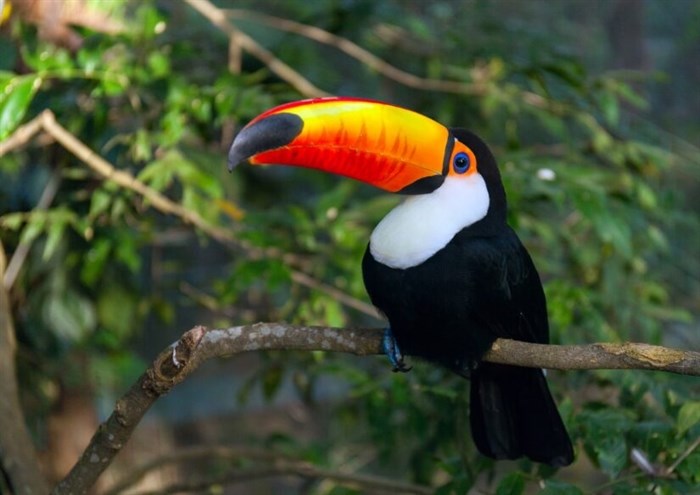
A toucan is pictured in this undated photo submitted by the BCSPCA.
Image Credit: SUBMITTED / BCSPCA
January 15, 2021 - 10:52 AM
The BCSPCA is calling on the federal government to end the international and domestic trade of exotic birds and other wild animals and asking Canadians to follow suit.
Dr. Sara Dubois, chief scientific officer for the SPCA, says a case where 50 parrots and toucans from Guyana were held at Vancouver International Airport on their way to Japan last month is just one example of the suffering inflicted on exotic animals exploited by global trade, according to a BCSPCA media release. A toucan was found dead and several others didn't have food.
“The exotic bird trade is immense, involving thousands of species and millions of individual birds each year,” Dubois said in the release. “At any given moment, untold numbers of birds are being caught and shipped around the world. Some are destined for the pet trade here in Canada. Others will merely pass through our borders on their way to being sold as pets in other countries.”
READ MORE: Kootenay SPCA takes 23 rabbits into care, reminds owners to spay or neuter
Birds come to Canada from as far away as Africa, Asia and South America and Canada also also serves as a stopover for shipments of birds on their way to other countries, the SPCA said. The United States, the European Union and others have essentially banned the import of wild-caught birds, Canada has yet to follow suit, leaving Canada open as a route for the exotic trade market, according to the SPCA.
Dubois said no matter where they come from or where they end up, the trade causes birds to suffer.
“For example, before they even reach the consumer, as many as 75 per cent of parrots taken from the wild die from stress, disease, rough handling, crushing, asphyxiation or dehydration during capture and transport," she said.
In order to feed the demand of the exotic bird market, baby birds are stolen straight from their nests as eggs or chicks while their helpless parents look on.
“Older individuals may be caught in mist netting or fishing line snares or lured onto sticky traps. Apart from the sheer terror this causes, many birds are injured in the process,” she said.
Dubois said birds are then subjected to incredibly harsh conditions during transport.
“They are often overcrowded in poorly ventilated containers without protection from fluctuating temperatures and are not provided with adequate food and water,” she said.
As countries have clamped down on the exotic bird trade, attention has turned to captive breeding, leading to a rise in large-scale operations which are the avian equivalent of puppy mills.
“These bird mills tend to keep birds in small, barren cages, depriving these sensitive, intelligent animals of the physical space, social interaction and stimulating environments they require,” Dubois said. “It’s important to note that, even when they’re bred in captivity, birds aren’t considered domesticated. They still have the same needs as their wild counterparts.”
In light of the COVID-19 pandemic, she said it’s also important to be aware of the disease risk posed by the exotic bird trade.
“The close confinement and highly stressful conditions associated with capture and transport makes birds more susceptible to infection, and endangers the people and other animals who come into contact with them."
The BCSPCA has joined a national coalition urging the government to end the wildlife trade and is calling on Canadians to add their voice by signing the federal government online petition.
To contact a reporter for this story, email Carli Berry or call 250-864-7494 or email the editor. You can also submit photos, videos or news tips to the newsroom and be entered to win a monthly prize draw.
We welcome your comments and opinions on our stories but play nice. We won't censor or delete comments unless they contain off-topic statements or links, unnecessary vulgarity, false facts, spam or obviously fake profiles. If you have any concerns about what you see in comments, email the editor in the link above.
News from © iNFOnews, 2021